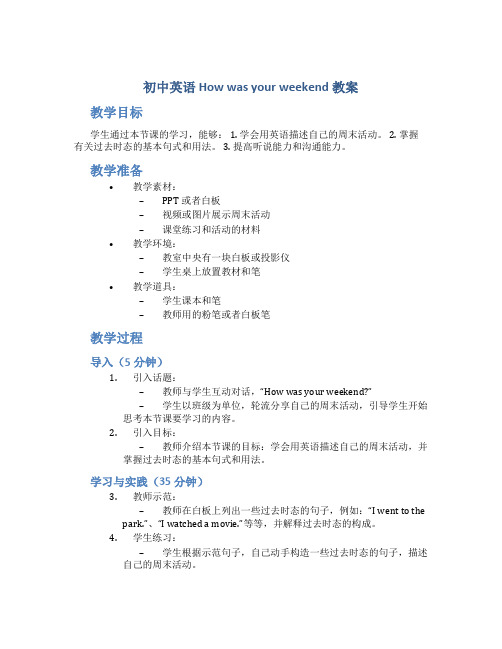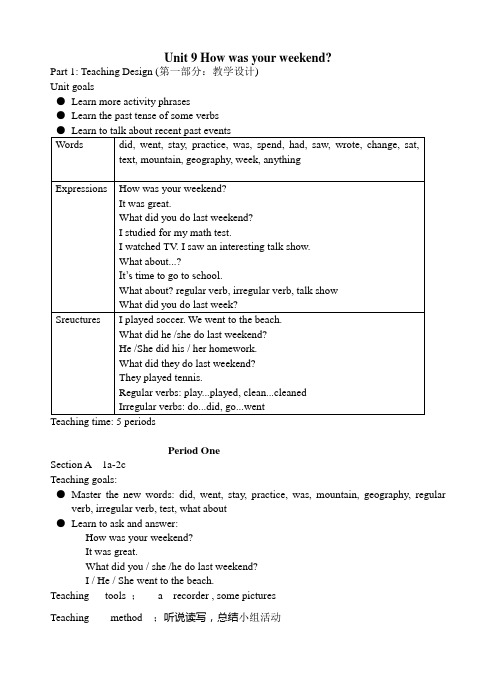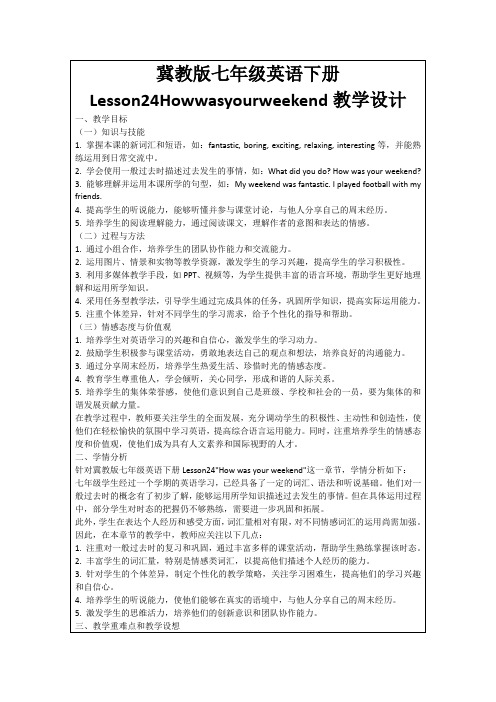七年级英语how was your weekend教案2
Howwasyourweekend教案

How was your weekend 教案一、教学目标1. 让学生能够用英语询问和回答关于周末的活动。
2. 让学生能够描述自己的周末活动,并能够用英语进行简单的交流。
3. 提高学生的英语听说能力和词汇量。
二、教学内容1. 词汇:movie, shopping, visit, cook, beach2. 句型:How was your weekend?What did you do?I watched a movie./I went shopping./I visited my grandparents./I cooked dinner./I went to the beach.三、教学步骤1. 热身(5分钟)教师与学生进行简单的对话,询问学生的一些基本信息,如姓名、年龄、年级等。
引导学生谈论一下他们的周末活动。
2. 引入新词汇(10分钟)教师展示与周末活动相关的图片,如看电影、购物、探亲访友、做饭、海滩等,并引导学生用英语描述这些活动。
教师将新词汇写在黑板上,如movie, shopping, visit, cook, beach等。
3. 学习句型(10分钟)教师引导学生用新学的词汇进行句型练习,如:How was your weekend?What did you do?I watched a movie./I went shopping./I visited my grandparents./I cooked dinner./I went to the beach.4. 小组活动(15分钟)学生分成小组,用英语互相询问周末活动,并记录下每个同学的回答。
每个小组选出一个代表进行汇报。
5. 总结与作业(5分钟)教师对本次课程进行总结,强调重点词汇和句型。
布置作业:用英语写一篇关于自己周末活动的短文。
四、教学评价1. 观察学生在课堂上的参与程度和口语表达能力。
2. 课后收集学生的作业,评估他们对词汇和句型的掌握程度。
How was your weekend 教案

How was your weekend 教案一、教学目标:1. 让学生掌握询问周末活动的交际用语。
2. 让学生能够用英语描述自己的周末活动。
3. 提高学生的听说能力和团队协作能力。
二、教学内容:1. 单词:weekend, activity, interesting, relax, busy2. 短语:How was your weekend? What did you do? I stayed at home. I went to the park. I watched a movie.三、教学重点与难点:1. 重点:询问周末活动和用英语描述周末活动。
2. 难点:单词和短语的正确运用。
四、教学方法:1. 任务型教学法:通过小组活动,让学生在实际语境中运用所学知识。
2. 交际法:通过模拟对话,让学生掌握询问和描述周末活动的交际用语。
五、教学步骤:1. 导入:教师与学生进行简单的交流,询问学生星期天的活动,引导学生谈论自己的周末。
2. 新课内容:教师介绍本节课的主题:询问和描述周末活动。
引导学生学习相关单词和短语。
3. 实践环节:学生分组,进行角色扮演,模拟询问和描述周末活动的场景。
教师巡回指导,纠正发音和语法错误。
4. 小组活动:学生分组,根据题目要求,用英语描述自己的周末。
教师评价并给予反馈。
5. 总结与作业:教师对本节课的内容进行总结,布置作业:用英语写一篇关于自己周末的短文。
六、教学评价:1. 课堂参与度:学生参与课堂活动的情况。
2. 口语表达能力:学生描述周末活动的准确性及流利程度。
3. 小组协作能力:学生在小组活动中的表现。
七、教学反思:教师在课后对教学效果进行反思,针对学生的掌握情况,调整教学策略,以提高教学效果。
八、教学拓展:1. 举办一次关于周末活动的英语角,让学生展示自己的成果。
2. 组织一次英语晚会,让学生在轻松的氛围中运用所学知识。
九、教学资源:1. 教材:人教版《英语》2. 课件:教师自制的PPT3. 录音机、磁带(可选)十、教学时间安排:1课时(40分钟)六、教学准备:1. 教师准备相关教学材料,包括课件、单词卡片、活动指南等。
初中英语How was your weekend的教案

初中英语 How was your weekend 教案教学目标学生通过本节课的学习,能够: 1. 学会用英语描述自己的周末活动。
2. 掌握有关过去时态的基本句式和用法。
3. 提高听说能力和沟通能力。
教学准备•教学素材:–PPT 或者白板–视频或图片展示周末活动–课堂练习和活动的材料•教学环境:–教室中央有一块白板或投影仪–学生桌上放置教材和笔•教学道具:–学生课本和笔–教师用的粉笔或者白板笔教学过程导入(5分钟)1.引入话题:–教师与学生互动对话,“How was your weekend?”–学生以班级为单位,轮流分享自己的周末活动,引导学生开始思考本节课要学习的内容。
2.引入目标:–教师介绍本节课的目标:学会用英语描述自己的周末活动,并掌握过去时态的基本句式和用法。
学习与实践(35分钟)3.教师示范:–教师在白板上列出一些过去时态的句子,例如:“I went to the park.”、“I watched a movie.”等等,并解释过去时态的构成。
4.学生练习:–学生根据示范句子,自己动手构造一些过去时态的句子,描述自己的周末活动。
–学生可以在小组内互相交流自己的周末活动,并用过去时态句子进行描述。
5.视频展示:–教师播放一段与周末活动相关的视频,并带领学生观看。
–视频结束后,教师引导学生就视频内容进行讨论,并用过去时态的句子进行描述。
6.PPT展示:–教师使用PPT展示一些图片,图片上显示了不同的周末活动。
–教师带领学生用英语描述图片上的周末活动,引导学生运用过去时态句子进行描述。
总结与巩固(10分钟)7.游戏活动:–教师设计一个小游戏,学生分成小组进行游戏。
–游戏规则:教师说出一个学生的名字,该学生要用英语描述自己的周末活动。
–其他小组成员要尽快猜出该学生的描述,并说出对应的过去时态句子。
8.小结复习:–教师带领学生回顾本节课学习的内容,强调过去时态的用法,并鼓励学生多多练习。
七年级下册Unit How was your weekend教案

Unit 9 How was your weekend?Part 1: Teaching Design (第一部分:教学设计)Unit goals●Learn more activity phrases●Learn the past tense of some verbsPeriod OneSection A 1a-2cTeaching goals:●Master the new words: did, went, stay, practice, was, mountain, geography, regularverb, irregular verb, test, what about●Learn to ask and answer:How was your weekend?It was great.What did you / she /he do last weekend?I / He / She went to the beach.Teaching tools ; a recorder , some picturesTeaching method ;听说读写,总结小组活动Teaching difficulties: talk about the past eventsTeaching proceduresStep one: Warming upAsk students about what they do on weekends.Model: T: How is your weekend?S: It’s great/ terrible, good, OK. / Not bad.T: What do you usually do on weekends?S: I usually play soccer / do my homework / clean my room ...T: How about your friend?S: She / He usually stays at home and watch TV.Step two: Presenting1.Make a list of the verb phrases students said just now on the blackboard.For example: play soccer, do my homework, clean my room, stay at home ,watch TV ...2.Go on asking students: What did you do last weekend?How was your last weekend?Help students answer, using the past tense of the verbs.Pay attention to the change of verbs’ formwatch TV ... watched TV, play soccer ... played soccerdo homework... did homework, go to the beach ... went to the beacham / is / ... was, are ... wereModel: T: What did you do last weekend?S: I played soccer and did homework.Step three: PracticingActivity 11.Students ask and answer in pairs about their last weekend in the same way.2.Check some pairs.Activity 21.Point to the pictures in 1a and ask students to tell what they see. Name eachactivity and repeat in the past tense.went to the movies, played soccer, went to the beach, did homework, playedtennis, cleaned my room2.Ask students to match each activity with one of the pictures.3.Check the answers.1.d2.b3.f4.c5.e6.a4.Students read the phrases aloud.Activity 3a)Students work in pairs to ask and answer about what the girl in 1a did ondifferent days.Model: A: What did she do in Picture a?B: She went to the movie.A: What did she do on Saturday morning?B: She played tennis.b)Check some pairs.Step four: Listening. (1b)1.Point to the activities in the picture in 1a. Ask students to listen carefully.3. Play the recording the second time. Students listen and write the day and morning, afternoon, night below each picture.4. Check the answers. Picture a: Saturday nightPicture b: Sunday afternoonPicture c: Saturday afternoonPicture d: Sunday nightPicture e: Saturday morningPicture f: Sunday morning5.Students listen again and repeat.Step five pairworkRole play students talk about their weekendsStep six exercise写出下列动词的过去式1.do2.play3.clean4.visit5.study6.practice7.have8.stay9.read 10.watch 11.cook 12.die13.get 14.sit 15.lookStep seven summary:1.谈论过去的事件。
冀教版七年级英语下册Lesson24Howwasyourweekend教学设计

(三)情感态度与价值观
1.培养学生对英语学习的兴趣和自信心,激发学生的学习动力。
2.鼓励学生积极参与课堂活动,勇敢地表达自己的观点和想法,培养良好的沟通能力。
3.通过分享周末经历,培养学生热爱生活、珍惜时光的情感态度。
4.教育学生尊重他人,学会倾听,关心同学,形成和谐的人际关系。
-鼓励学生积极参与小组讨论,培养他们的团队协作能力和口语表达能力。
-教师巡回指导,关注学生的讨论过程,适时给予建议和帮助。
(四)课堂练习
1.教学内容:
-听力练习:听一段关于周末活动的对话,回答相关问题。
-口语练习:两人一组,运用一般过去时进行对话练习。
-写作练习:写一篇关于自己周末经历的小短文。
2.教学策略:
3.教学过程设想:
-引入环节:通过提问学生关于周末的常见问题,如"What do you usually do on weekends?",激发学生的兴趣,自然过渡到本课的主题。
-新课内容展示:结合课本内容,通过PPT或实物展示,教授新词汇和短语,让学生在真实的语境中学习。
-互动环节:设计小组活动,如“周末经历分享”,让学生运用所学知识进行实际交流,提高他们的听说能力。
-设计不同难度的练习题,包括填空、选择、改写句子等,帮助学生巩固动词过去式的变化规则。
2.针对学生的个性化教学设想:
-对于基础薄弱的学生,教师可以提供更多的语言支持和指导,确保他们能够跟上教学进度。
-对于基础较好的学生,可以设计更具挑战性的任务,如编写小故事、进行即兴对话等,以提升他们的语言运用能力。
2.口语作业:
-学生与家长或朋友进行一次对话,互相询问对方的周末经历,并使用一般过去时态进行回答。要求每位学生至少准备5个问题,并在对话中尽可能多地使用本节课学到的词汇。
七年级英语Howwasyourweekend教案

七年级英语How was your weekend 教案一、教学目标1. 知识目标学生能够听懂、会说、会读how was your weekend 这个词组。
学生能够用how was your weekend 询问他人并回答。
学生能够掌握一般过去时的疑问句和回答。
2. 能力目标学生能够用英语简单描述自己或他人的周末活动。
学生能够在日常生活中运用how was your weekend 进行交流。
3. 情感目标学生能够培养学生对英语的兴趣,提高学生学习的积极性。
二、教学重点与难点1. 教学重点学生能够掌握how was your weekend 这个词组的用法。
学生能够用英语描述自己或他人的周末活动。
2. 教学难点学生能够正确使用一般过去时进行提问和回答。
三、教学方法1. 情景教学法通过设定情景,让学生在实际情境中学习和使用how was your weekend。
2. 交际教学法通过小组讨论和角色扮演等活动,培养学生用英语进行交际的能力。
四、教学步骤1. 导入教师与学生用中文进行简单的交流,了解学生的情况。
教师用英语提问:“How was your weekend?”,并引导学生用中文回答。
2. 新课呈现教师展示图片,引导学生用中文描述图片中的场景。
教师用英语提问:“How was your weekend?”,并引导学生用英文回答。
3. 单词教学教师讲解how was your weekend 这个词组的用法。
学生跟读,教师纠正发音。
4. 句型练习教师引导学生用how was your weekend 提问他人并回答。
学生进行小组讨论,用英语描述自己或他人的周末活动。
5. 课堂活动教师组织学生进行角色扮演,模拟生活中使用how was your weekend 的场景。
学生进行表演,教师给予评价和指导。
五、课后作业1. 学生用英语写一篇短文,描述自己或他人的周末活动。
2. 学生回家后,与家人用英语进行交流,尝试使用how was your weekend。
冀教版初中英语七年级下册《Lesson 24 How was Your Weekend》word教案 (2)

How Was Your Weekend教学目标1、Master the following words:everybody, yummy2、Common phrases:have a great/ good weekend, take a bus, It’s …away from…3、Get students to know how to make a telephone call correctly.教学重点Get students to know how to make a telephone call correctly. Vocabulary and patterns in this lesson教学难点It’s … away from…教学方法Reading、listening、Teaching、questions and answers教学资源Electronic whiteboard, Multimedia courseware教学步骤教师活动学生活动调整与思考教学过程设计Step I Class Opening (5 minutes)(1) GreetingT: Good morning, class! How are you today?Ss: Good morning, Miss Gui! Fine, thank you.And you?T: I’m fine, too.(2) ReviewHave a dictation about the words and phrasesin last lesson.Step II New Concepts (24 minutes)1.Lead-inT: What did you do last weekend?S1: I played the piano.S2: I played volleyball with my friends.S3: I drew at home.S4: I read a book at the library.…T: What are you going to do next weekend?S1: I’m going to stay home.S2: I’m going to watch a movie with myfriends.S3: I’m going to read a book at home.S4: I’m going to practice English.…2. PresentationAsk the students to read the title of Lesson24 and discuss.T: What tense is the title in? (Help thestudents answer this question.)Ss. It’s in the past tense.T: Very good. Now how to answer?GreetingsWritingQuestionsand answersReadingListening最新初中英语精品资料设计1教学过程设计S1: I had a good time.T: Wonderful! How is your weekend going?S2: I’m having a good time.T: That’s right.Write the statements I had a great weekend,I’m having a great weekend, I’m going to /will have a great weekend on the blackboard.Ask the students to identify the tense forevery statement.T: Please lool at the PPT6-8. What’s shedoing?Ss: She is making donuts.T: What are they doing?Ss: They are climbing a mountainT: Look at the cake. Wow! It looks yummy!.3.ListeningLet’s Do It ! do No 1.Listen and match thepictures with the questions.Discuss the answers as a class.4. Future study of the text1). Read the text by yourselves,please, andtry to finish Let’s Do It ! do No 2 -4.Ss should check and correct their answers in groups. Then discuss the answers as a class.2). Language points.PPT15-16Step III Practice (15minutes) PPT17-19Step IV Class Closing (1 minute)Let’s see our homework for today.checked作业1、Do the exercises in English supporting exercise copy.2、Try to write about your activities of last weekend and your plan for the next weekend.3、review the next lesson.板书设计Lesson 24 How Was Your Weekend? Mountain climbing is so funOn the bus教学反思最新初中英语精品资料设计2。
初中七年级英语:How was your weekend教案

新修订初中阶段原创精品配套教材How was your weekend教案教材定制 / 提高课堂效率 /内容可修改How was your weekend教师:风老师风顺第二中学编订:FoonShion教育How was your weekend教案unit 9 how was your weekend?复习学案i. 重点短语集结号:写出动词过去时态1. 你周末如何?how was your weekend?how do you like your w eekend ? what do you think of your weekend ?2. 打扫我的房间clean( ) my room3. 去海滩go()to the beach4. 去看电影/去爬山go to the movies/mountains5. 在星期六的早上on saturday morning6. 看望我的姑妈visit()my aunt7. 做运动do()some sports8. 准备科学考试study()for the science test9. 呆在家stay()at home10. 举行一个聚会have()a party11. 读书do some reading12. 练习英语practice()english13. 学地理study()geography14. 对于大多数孩子来说for most kids15. 为我做晚饭cook()dinner for me16.读一本关于历史的书read()a book about history17. 看一个有趣谈话类节目see()an interesting talk show18. 写一首新歌write()a new song19. 练习我的吉他practice()my guitar20. 上个月/周末/周last month/weekend/week21. 去散步go()for a walk22. 坐下sit()down23. 看他和一只有好的黑猫玩watch()him play with a friendly black cat24. 该回家了it is()time to go home25. 寻找他的狗look()for his dog26. 打排球play()volleyball27. 有点儿难 a little difficultii. 重点点拨:1.拜访visitvisit 喜欢____ 某人或____ 某地(1)拜访某人他经常访友。
- 1、下载文档前请自行甄别文档内容的完整性,平台不提供额外的编辑、内容补充、找答案等附加服务。
- 2、"仅部分预览"的文档,不可在线预览部分如存在完整性等问题,可反馈申请退款(可完整预览的文档不适用该条件!)。
- 3、如文档侵犯您的权益,请联系客服反馈,我们会尽快为您处理(人工客服工作时间:9:00-18:30)。
新目标Unit 9 How was your weekendUnit 9 How was your weekend?No. 110 Middle School of Chongqing By Cao YiTeaching Goal:1. General aims:Talk about recent past events2. Particular aims:A. Language Focus.Talk about recent past events and think of the past events.B. Language goalsHow was….?It was …What did …do over the weekend?C. Language structures:(1). How was your weekend? I was great. Pay attention to no form.(2). What did you do over the weekend? I played soccer. We went to the beach.D. Useful words and phrases:Words: was, did, went, beach, over, project, test, wasn’t, false, number, geography, spend, week, most, mixture, their, had, little, cook, read, saw, change, everyone, sit, sat, no, anything Phrases: did one’s homework, played soccer, cleaned my room, went to the beach, played tennis, went to the movies, on Saturday morning, over the weekend, cook … for, what about, do some reading, have a party, talk show, go shoppingE. Grammar language:Present simple past tenseRegular and irregular verbsF. Learning strategies:Tour and holidaysG. Interdiscipinary:H. Emotion and manner:Teaching time: 5 periodsTeaching procedures:Period One教学步骤、时间教师活动学生活动媒体应用Step 1Free talk 3’ Ask some questions like:Who’s on duty today?What’s the weather like? Answer and talk about something.让同学们回答下列问题1. Do you like weekend? (Let some students answer)It takes them three minutes to talk about the question.2. Why do you like weekend? (let the students answer) Most of the students like the weekend此时教师用汉语问:“在周末期间问你干了什么?这句话用英语这么回答?Let the students guess.At last the teacher give them right answer3. What did you do over the weekend?(板书、学习)4. What did you do over the weekend? (Let sb. answer the question) I-played basketball.5. 出示三张照片(有各种活动)6. Match the words with the picture7. Let the students listen and write carefully. First listen, then listen and write the words like “morning afternoon”or “night”等Find some students to answer.The students talk about it in pairs.Students think of the sentences.Students study and read the sentencesFirst the students read after the teacher, the practice in pairs.学生看图,互相问答:What did you do?The students look at the picture on page 29 and do it.Listen and write carefully.媒体展示问题多媒体放映图一、图二、图三(关于周末的活动)Step 3Practice(5’) PairworkRole play students A ask and student B answerThen let them do it in pairs A: What did you do over the weekend, Lucy?B: I played tennis.Students do it in pairs.Step listen to2a and 2b (5’) Listen and underline the words you hear, then listen again and write. Listen and underlineListen and write A \ B \ S carefullyStep 5Summary (2’) 1. Words and phrases of the class.2. What did you do over the weekend?I played —. Look and listen carefullyStep 6Test (5’) Selfcheck 1 and 2c Students do it 放映多媒体Step 7Consolidation Make a dialogue use “What did —?”at least five questions.Divide the students into 7 groups.Step 8拓展练习(3’) 1. What did you do over the Weekend?2. What did you do over the weekday? Students answer did things in different times. 多媒体展示、总结Step 9Homework (1’). 1. Practise the dialogue.2. Grasp the grammar Focus. 多媒体放映Period Two教学步骤、时间教师活动学生活动媒体应用Step 1Free talk (2’) Ask a student “Do you like weekend”?Do you like weekday? The students answer and talk.Step2Presention (10’) (用班里学生为例作下列练习)1. What did you do over the weekend?2. First let the students draw a picture of weekend然后让他们利用实物投影向我们说明3. 用“What did you do over the weekend?”询问几个学生后,这着一个学生问“你的周末怎么样?”4. Let the students change it into English.板书“How was your weekend?”Then let the students practice in pairs.5. Write number (1-3) in the blanks. 1. Draw a picture of weekend2. Tell the class about your weekend like” I played basketball in the morning.3. The student answers. (have a try)Guess:How was your weekend?Read and studyThen do it in pairs.Ex: How was your weekend?It’s great.I played basketball.Look at the picture in 3a. and write unmbers. 实物投影媒体展示媒体展示答案Step 3Game 6’ Let Ss write 3 things they did ov er the weekend.One is false, the others are true. 然后把学生的描述利用实物投影机投到大屏幕上。
Write 3 sentences ion their paper.Look at the screen.Let the other Ss guess which one is true/false. 实物投影Step 4Summary 3’ 1. words2. Grammar:How was your weekend?I was great. / I did …Read and remember 媒体显示Step 5Consolidation 10’ Divide the Ss into several groups. Every group must make up a dialogue.Use “What did you do on the weekend?”/How was your weekend? And so on. Make up a dialogue in groups and act it.Step 6拓展练习5’ 1. 让学生回忆一般过去时态。
